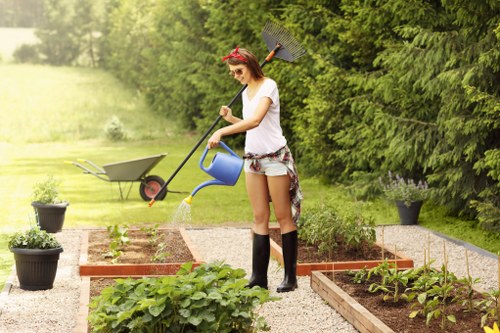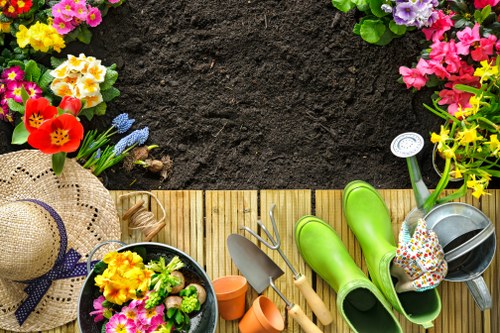Garden Maintenance in Finsbury Park

Maintaining a beautiful garden in Finsbury Park requires a blend of passion, knowledge, and consistent care. Whether you're a seasoned gardener or a novice, understanding the unique aspects of garden upkeep in this vibrant area can transform your outdoor space into a lush, thriving oasis.
Finsbury Park's climate and soil conditions play a significant role in determining the best practices for garden maintenance. With its temperate weather and rich soil, the park offers an ideal environment for a variety of plants, making it a gardener's paradise.
Regular maintenance tasks such as pruning, weeding, and fertilizing are essential to keep your garden healthy and aesthetically pleasing. These tasks not only enhance the appearance of your garden but also promote the growth and vitality of your plants.

Essential Garden Maintenance Tips
To achieve a well-maintained garden in Finsbury Park, it's crucial to follow a set of essential maintenance tips. These guidelines will help you create a sustainable and beautiful garden environment.
1. Regular Pruning: Pruning helps in removing dead or diseased branches, promoting better air circulation, and encouraging healthy growth. It's recommended to prune your plants during the dormant season to minimize stress.
2. Effective Weeding: Weeds can compete with your plants for nutrients and water. Regularly removing weeds ensures that your garden plants receive the necessary resources to thrive.

Seasonal Garden Care
Understanding the seasonal changes in Finsbury Park is vital for effective garden maintenance. Each season brings its own set of challenges and opportunities for garden care.
Spring Maintenance
Spring is the perfect time to prepare your garden for the growing season. This includes planting new flowers, mulching, and fertilizing the soil to promote healthy growth.
Summer Care
During the summer months, ensuring adequate watering and providing shade for sensitive plants is essential. Regular monitoring for pests and diseases can prevent potential damage.

Choosing the Right Plants
Selecting plants that are well-suited to Finsbury Park's climate can significantly reduce maintenance efforts. Consider native plants as they are adapted to the local environment and require less care.
- Lavender: A resilient plant that thrives in full sun and well-drained soil.
- Roses: With proper care, roses can add a touch of elegance and fragrance to your garden.
- Hostas: Ideal for shaded areas, hostas offer lush foliage and vibrant blooms.
Incorporating a mix of perennials and annuals can create a dynamic and colorful garden throughout the year.

Professional Garden Maintenance Services
For those who prefer to leave garden maintenance to the experts, there are numerous professional services available in Finsbury Park. These services offer tailored solutions to meet your garden's specific needs.
Professional gardeners can provide comprehensive care, including landscape design, pest control, and seasonal maintenance. Hiring a professional ensures that your garden remains in optimal condition with minimal effort on your part.
Benefits of Hiring Professionals
- Expert knowledge and experience
- Time-saving
- Access to specialized tools and equipment
- Customized maintenance plans
Investing in professional garden maintenance can enhance the beauty and functionality of your outdoor space.

Eco-Friendly Gardening Practices
Implementing eco-friendly gardening practices not only benefits your garden but also the environment. Sustainable methods can lead to healthier plants and a more resilient garden ecosystem.
Composting
Composting organic waste reduces landfill usage and provides rich nutrients for your soil. It’s an excellent way to recycle kitchen scraps and garden waste.
Rainwater Harvesting
Collecting rainwater for irrigation conserves water and reduces your garden's reliance on municipal water supplies. Installing rain barrels can make this process efficient and effective.
Adopting these practices promotes a sustainable garden that can thrive with minimal environmental impact.

Pest and Disease Management
Managing pests and diseases is a critical aspect of garden maintenance. Effective strategies can prevent significant damage and ensure the health of your plants.
Integrated Pest Management (IPM)
IPM combines biological, cultural, and chemical methods to control pests with minimal environmental impact. This approach emphasizes prevention and sustainable practices.
- Biological Control: Introducing natural predators to combat pest populations.
- Cultural Practices: Rotating crops and maintaining plant health to deter pests.
- Chemical Control: Using pesticides as a last resort to manage severe infestations.
Regular monitoring and early intervention are key to effective pest and disease management.

Tools and Equipment for Garden Maintenance
Having the right tools and equipment can make garden maintenance tasks easier and more efficient. Investing in quality tools ensures longevity and better performance.
Essential Tools
- Pruning Shears: For trimming and shaping plants.
- Garden Fork: Useful for turning soil and aerating beds.
- Watering System: Efficient irrigation tools for consistent plant hydration.
Maintaining your tools by cleaning and storing them properly extends their lifespan and ensures they remain effective.

Creating a Sustainable Garden
A sustainable garden balances aesthetics with environmental responsibility. By implementing sustainable practices, you can create a garden that is both beautiful and eco-friendly.
Native Plant Selection
Choosing native plants supports local biodiversity and reduces the need for excessive watering and fertilizers.
Mulching
Applying mulch helps retain soil moisture, suppress weeds, and improve soil quality. Organic mulches also add nutrients as they decompose.
Embracing sustainability in your garden fosters a healthy ecosystem and reduces your environmental footprint.

Lighting and Garden Features
Incorporating lighting and other garden features can enhance the beauty and functionality of your garden, especially during the evening hours.
Outdoor Lighting
Strategically placed lights highlight key features and provide safety pathways. Solar-powered lights are an eco-friendly option.
Water Features
Adding fountains or ponds can create a calming atmosphere and attract wildlife to your garden.
- Fountains: Offer soothing sounds and visual appeal.
- Ponds: Support aquatic plants and wildlife, enhancing biodiversity.
Enhancing your garden with these features can create a serene and inviting outdoor space.

Maintaining Lawn Health
A well-maintained lawn is the foundation of a beautiful garden. Proper lawn care involves mowing, watering, and fertilizing to ensure thick and healthy grass.
Mowing Techniques
Mowing your lawn to the appropriate height promotes deeper root growth and reduces weed proliferation. It's recommended to mow regularly during the growing season.
Watering Practices
Deep and infrequent watering encourages strong root systems. Early morning watering minimizes evaporation and fungal growth.
Consistent lawn maintenance results in a vibrant and resilient grassy area.

Garden Design and Layout
Thoughtful garden design enhances both the functionality and beauty of your outdoor space. A well-planned layout can make maintenance easier and create visually appealing areas.
Choosing a Layout
Consider factors such as sunlight, soil type, and plant requirements when planning your garden layout. Grouping plants with similar needs can simplify maintenance.
Incorporating Pathways
Pathways provide easy access to different garden areas and add structure to your design. Materials like gravel, stone, or wood can be used to create decorative and functional paths.
A strategic garden design not only enhances aesthetics but also promotes efficient maintenance routines.

Mulching for Garden Health
Mulching is a fundamental aspect of garden maintenance that offers numerous benefits for plant health and soil quality.
Benefits of Mulching
- Retains soil moisture
- Suppresses weed growth
- Regulates soil temperature
- Improves soil structure
Organic mulches, such as bark or compost, enrich the soil as they break down, providing essential nutrients for plants.
Mulching Techniques
Apply a 2-3 inch layer of mulch around plants, ensuring it's kept away from stems and trunks to prevent rot. Replenish mulch as needed to maintain its effectiveness.

Irrigation Systems
Efficient irrigation systems are crucial for maintaining optimal soil moisture levels and ensuring plants receive adequate water.
Types of Irrigation Systems
- Drip Irrigation: Delivers water directly to the plant roots, minimizing evaporation.
- Sprinkler Systems: Provide broad coverage, ideal for lawns and large garden areas.
- Soaker Hoses: Allow water to seep slowly into the soil, promoting deep root growth.
Choosing the right irrigation system depends on your garden's specific needs and layout.

Pruning and Trimming
Regular pruning and trimming are essential for maintaining plant health and shaping your garden's appearance.
Pruning Techniques
Use sharp, clean tools to make precise cuts, removing dead or diseased branches and encouraging new growth. Prune at the correct time of year for each plant species.
Trimming Hedges and Bushes
Maintaining the shape of hedges and bushes enhances the overall structure of your garden. Regular trimming prevents overgrowth and promotes a neat, orderly appearance.
Consistent pruning and trimming contribute to a well-maintained and attractive garden.

Soil Health and Fertilization
Healthy soil is the foundation of a thriving garden. Proper soil management and fertilization ensure that plants receive the necessary nutrients for growth.
Testing Soil Quality
Conduct soil tests to determine pH levels and nutrient content. Understanding your soil's composition helps in selecting the right amendments and fertilizers.
Fertilization Practices
- Organic Fertilizers: Enhance soil structure and provide slow-releasing nutrients.
- Synthetic Fertilizers: Offer targeted nutrient boosts but require careful application to avoid overuse.
Regularly amending your soil with compost or other organic materials improves fertility and promotes healthy plant growth.

Dealing with Seasonal Challenges
Seasonal changes bring different challenges to garden maintenance. Being prepared for these variations ensures year-round garden health.
Winter Care
Protect plants from frost by using covers and mulches. Prune perennials and prepare garden beds for the upcoming spring.
Summer Heat
Provide adequate shade and increase watering frequency to help plants cope with high temperatures. Monitor for signs of heat stress.
Adapting your maintenance practices to seasonal changes keeps your garden resilient and vibrant throughout the year.

Encouraging Wildlife in Your Garden
Attracting wildlife to your garden enhances its biodiversity and creates a lively ecosystem. Incorporate features that support birds, insects, and other beneficial creatures.
Bird-Friendly Gardens
Install bird feeders, birdhouses, and water sources to entice various bird species. Planting native shrubs and trees provides natural habitats.
Attracting Pollinators
Planting flowers that attract bees, butterflies, and other pollinators supports plant reproduction and overall garden health.
Creating a wildlife-friendly garden promotes a balanced and sustainable environment.

Sustainable Garden Practices
Sustainability in garden maintenance ensures long-term health and reduces environmental impact. Implementing eco-friendly practices benefits both your garden and the broader ecosystem.
Water Conservation
Use drought-resistant plants and efficient irrigation systems to minimize water usage. Collecting rainwater is an excellent way to conserve water for garden use.
Reducing Chemical Use
Opt for natural pest control methods and organic fertilizers to reduce reliance on harmful chemicals. This approach protects beneficial insects and maintains soil health.
Adopting sustainable practices leads to a resilient and eco-friendly garden.

Conclusion and Next Steps
Maintaining a garden in Finsbury Park is a rewarding endeavor that enhances your living space and contributes to the community's natural beauty. By following the tips and practices outlined in this article, you can ensure that your garden remains healthy, vibrant, and sustainable.
Whether you choose to undertake garden maintenance yourself or hire professional services, the key is consistency and care. A well-maintained garden not only provides aesthetic pleasure but also offers a sanctuary for relaxation and enjoyment.
Contact us today to learn more about our garden maintenance services in Finsbury Park and take the first step towards transforming your outdoor space.
